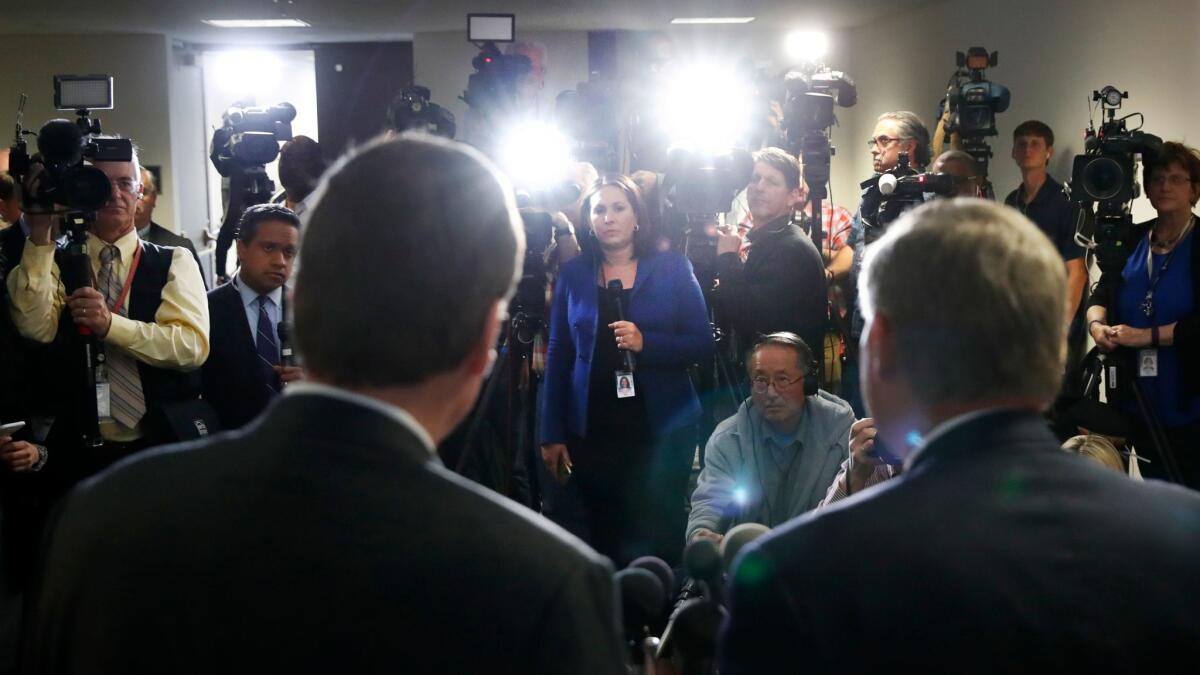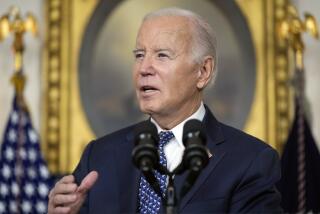Op-Ed: Don’t worry, the FBI won’t give up the Russia investigation

Much remains unclear about the sudden firing of FBI Director James Comey, but one point is beyond dispute: The original proffered reason for the dismissal — that Comey made improper public comments about the bureau’s investigation into Hillary Clinton’s use of a private e-mail server — was pretextual.
Comey’s public commentary on the email investigation was a violation of longstanding Justice Department policies, and a firing offense. But his comments were plainly not the reason the president lowered the boom: Candidate Trump loudly praised Comey’s actions at the time. And the president has now shifted ground, admitting that the decision was unrelated to the email controversy.
When the administration, already operating under a cavernous truth deficit, offers a manifestly false account of such a significant action, the foreseeable result is that critics will assume the worst, and that comparisons to Watergate will swirl around the White House.
In fact the move has been widely criticized as “Nixonian,” invoking the specter that the president acted to impede the FBI’s ongoing investigation into the Trump campaign’s dealings with figures from the Russian government. Maybe something sinister like this is at work. Or maybe the firing was just a fit of pique by this most erratic and adolescent of presidents.
No ingenious use of parking garages and potted plants is required today to publicize nefarious political interference by the White House.
But — and this is the key point that should calm patrons of the darkest fantasies — if the president’s goal in firing Comey was to scuttle the Russia investigation, he has overplayed his hand. An investigation is underway, staffed by handpicked agents of an organization that is acutely aware of — if not obsessed with — its image as the premier federal law enforcement agency in the country.
For these agents, the investigation is a career-making opportunity. And their motivation has now been augmented by outrage at Comey’s firing, which the agency sees as an assault on its independence.
They are, moreover, sophisticated actors who know how to press the levers of Washington — including the press and the staffers of congressional investigative committees — to fight back against any effort to curb their work.
If, for example, the president were to replace Comey with a lackey who attempted to throw sand in the gears of the investigation, the effort would leak to the press in a Washington minute. And the likely outcome would be the swift appointment of an independent counsel, who would be able to insist on ample investigative resources and unfettered discretion.
The president has now waded into truly dangerous waters with his tweet war on Comey and his suggestion that Comey “better hope” that there are no secret tapes of their conversations. No one of any sophistication could possibly credit the president’s version of events.
In light of the comparisons to Watergate, it should not be forgotten that Deep Throat, the source who was instrumental in thwarting the conspiracy and bringing Nixon down, was the deputy director of the FBI. And that scandal took place in a pre-email era when leaking was a much more complicated enterprise. No ingenious use of parking garages is required today to publicize nefarious political interference by the White House.
Nor is it obvious that the president has the political maneuvering room to install a yes-man at the FBI. The choice will be the most scrutinized of his presidency, and the political establishment broadly wants to maintain the FBI’s ethos of independence. It would take the defection of only a few Republican senators to reject a questionable nominee, or, far more ominous to the administration, to establish a bipartisan select congressional committee that can undertake its own investigation.
The administration will therefore be under pressure to select a candidate of known integrity with experience in the ways of the FBI, such as former Deputy Atty. Gen. Mark Filip.
There’s one last line of defense in the form of Deputy Atty. Gen. Rod Rosenstein, who will oversee the Russia investigation for the Justice Department.
Rosenstein, who wrote the memo about Comey’s approach to the Clinton business, has already resisted the administration’s efforts to paint him as the moving force behind the director’s dismissal. And like the other players in the drama, Rosenstein has strong cards to play against White House overreaching. The strongest of these is a threat to resign, which would be a disaster for the administration. All indications are that Rosenstein is resolved to be seen as ensuring an independent investigation. Expect him soon to announce that additional resources have been devoted to the Russia case, as Comey reportedly had requested. The White House will have little choice but to feign support.
All this means that the Russia investigation is not going away any time soon, and that “all the president’s men,” and possibly the president himself, will remain squarely in the crosshairs of the FBI and the Department of Justice.
Harry Litman, a former United States attorney and deputy assistant attorney general, teaches at UCLA Law School and practices law at Constantine Cannon.
Follow the Opinion section on Twitter @latimesopinion or Facebook
More to Read
A cure for the common opinion
Get thought-provoking perspectives with our weekly newsletter.
You may occasionally receive promotional content from the Los Angeles Times.






